C Programming Mastery
Master the fundamentals of coding with our C programming course, built for beginners and aspiring developers. Whether you're starting from scratch or brushing up on your basics, this C programming language course will help you learn C programming through hands-on projects and expert guidance.
Level : Intermediate
Duration :90 hrs
Rating : 4.9/5
Language : C
Activate this Course for :
₹ 2999
2999
Activate this Course for :
₹ 3999
3999
Enter Details
C Programming Mastery Course Overview
Understand the structure and syntax of the C programming language
Learn how to write functions, use loops, arrays, pointers, and memory management
Explore real-time examples and complete practical assignments
Get guided projects to apply your learning
Receive certification upon completion of this C program course
C Programming Mastery Course Includes
Certification After completing the courses
We Provides 24/7 Dedicated Forum Support
Accessing to AI tools to enhance coding skills
C Programming Mastery Course Contents
-
1.1.History and features of C
-
1.2.Structure of a C program
-
1.3.Compiling and executing a C program
-
1.4.IDE and setup
-
1.1.History and features of C
-
1.2.Structure of a C program
-
1.3.Compiling and executing a C program
-
1.4.IDE and setup
-
2.1.Basic data types
-
2.2.Constants, literals
-
2.3.Variable declaration and initialization
-
2.4.Type modifiers
-
2.1.Basic data types
-
2.2.Constants, literals
-
2.3.Variable declaration and initialization
-
2.4.Type modifiers
-
3.1.Arithmetic, relational, logical, assignment, bitwise
-
3.2.Increment/decrement
-
3.3.Operator precedence and associativity
-
3.1.Arithmetic, relational, logical, assignment, bitwise
-
3.2.Increment/decrement
-
3.3.Operator precedence and associativity
-
4.1.If, if-else, nested if
-
4.2.Switch-case
-
4.3.Loops: for, while, do-while
-
4.4.Break, continue, goto
-
4.1.If, if-else, nested if
-
4.2.Switch-case
-
4.3.Loops: for, while, do-while
-
4.4.Break, continue, goto
-
5.1.Defining and calling functions
-
5.2.Function arguments and return types
-
5.3.Recursion
-
5.4.Scope and storage classes
-
5.1.Defining and calling functions
-
5.2.Function arguments and return types
-
5.3.Recursion
-
5.4.Scope and storage classes
-
6.1.Single and multi-dimensional arrays
-
6.2.Initialization and memory layout
-
6.3.Array operations and limitations
-
6.1.Single and multi-dimensional arrays
-
6.2.Initialization and memory layout
-
6.3.Array operations and limitations
-
7.1.String literals and character arrays
-
7.2.String handling functions (strlen, strcpy, etc.)
-
7.3.Common pitfalls
-
7.1.String literals and character arrays
-
7.2.String handling functions (strlen, strcpy, etc.)
-
7.3.Common pitfalls
-
8.1.Pointer basics, pointer arithmetic
-
8.2.Pointer to pointer
-
8.3.NULL and dangling pointers
-
8.1.Pointer basics, pointer arithmetic
-
8.2.Pointer to pointer
-
8.3.NULL and dangling pointers
-
9.1.malloc, calloc, realloc, free
-
9.2.Memory leaks and best practices
-
9.1.malloc, calloc, realloc, free
-
9.2.Memory leaks and best practices
-
10.1.Defining structures, nested structures
-
10.2.Accessing members via pointer
-
10.3.Unions vs structures
-
10.1.Defining structures, nested structures
-
10.2.Accessing members via pointer
-
10.3.Unions vs structures
-
11.1.fopen, fclose, fread, fwrite
-
11.2.File modes and error handling
-
11.3.Text vs binary files
-
11.1.fopen, fclose, fread, fwrite
-
11.2.File modes and error handling
-
11.3.Text vs binary files
-
12.1.#define, #include, #ifdef, #ifndef
-
12.2.Macros with and without arguments
-
12.3.Header file creation
-
12.1.#define, #include, #ifdef, #ifndef
-
12.2.Macros with and without arguments
-
12.3.Header file creation
-
13.1.AND, OR, XOR, NOT, bit shifts
-
13.2.Masking and toggling bits
-
13.1.AND, OR, XOR, NOT, bit shifts
-
13.2.Masking and toggling bits
-
14.1.argc and argv usage
-
14.2.Passing arguments to main
-
14.3.Parsing CLI inputs
-
14.1.argc and argv usage
-
14.2.Passing arguments to main
-
14.3.Parsing CLI inputs
-
15.1.Using gdb
-
15.2.Creating and using makefiles
-
15.3.Basic profiling tools
-
15.1.Using gdb
-
15.2.Creating and using makefiles
-
15.3.Basic profiling tools
-
16.1.Combining concepts into a project
-
16.2.Code organization and modularity
-
16.3.Documentation and review
-
16.1.Combining concepts into a project
-
16.2.Code organization and modularity
-
16.3.Documentation and review
Benefits
Our Dashboard offers 1500+ coding problems to sharpen skills and prepare for company-specific interviews. Track progress, build your profile, and boost job-readiness for successful technical interviews
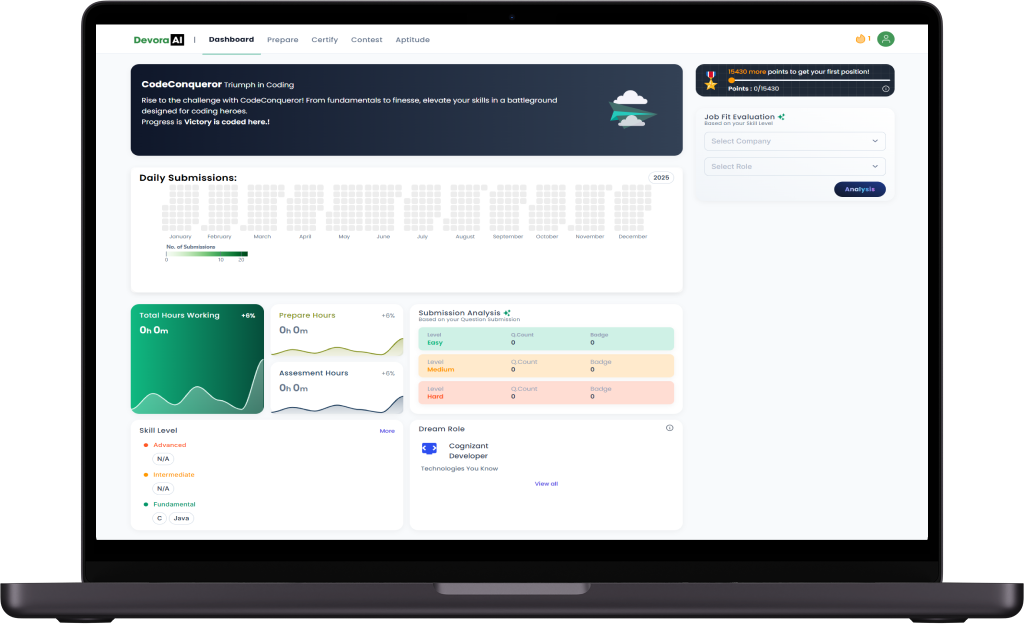
Our product provides real-time debugging assistance, allowing learners to efficiently identify and fix errors, enhancing their programming skills and understanding
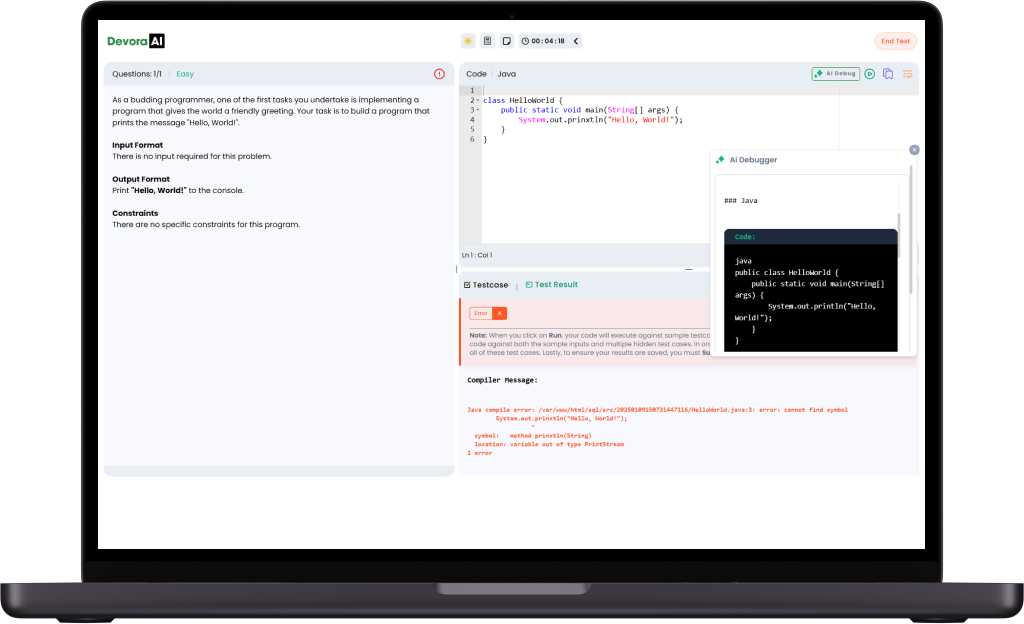
Our integrated IDE compiler offers a unified platform for writing, executing, and debugging code efficiently. With real-time execution and instant feedback, users can test and optimize their code seamlessly.
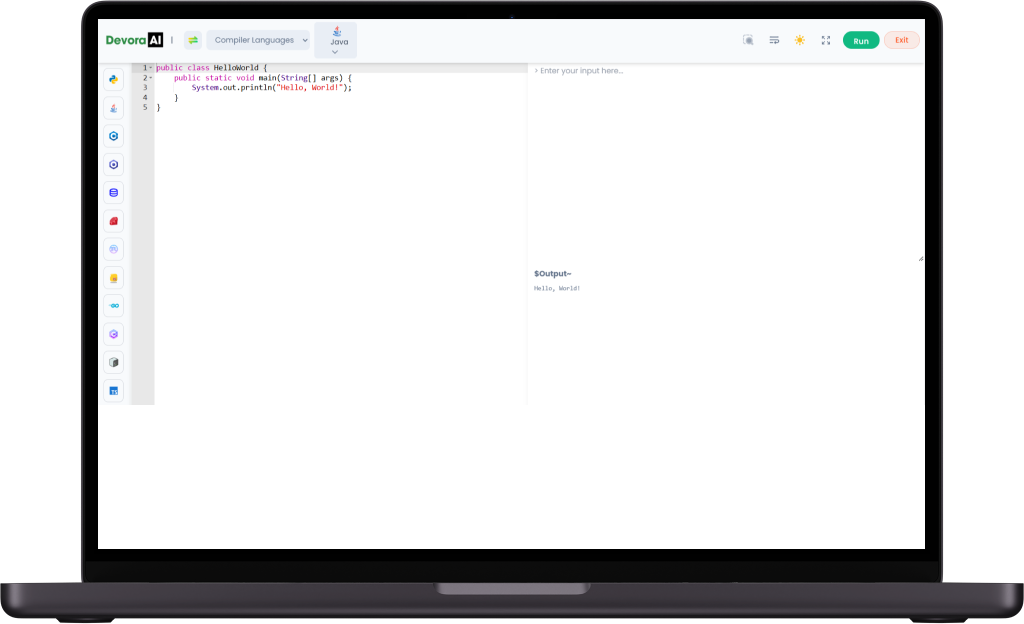
we organize coding contests within the platform, offering users the opportunity to compete against peers, test their problem-solving abilities, and enhance their skills through time-bound challenges and real-world scenarios
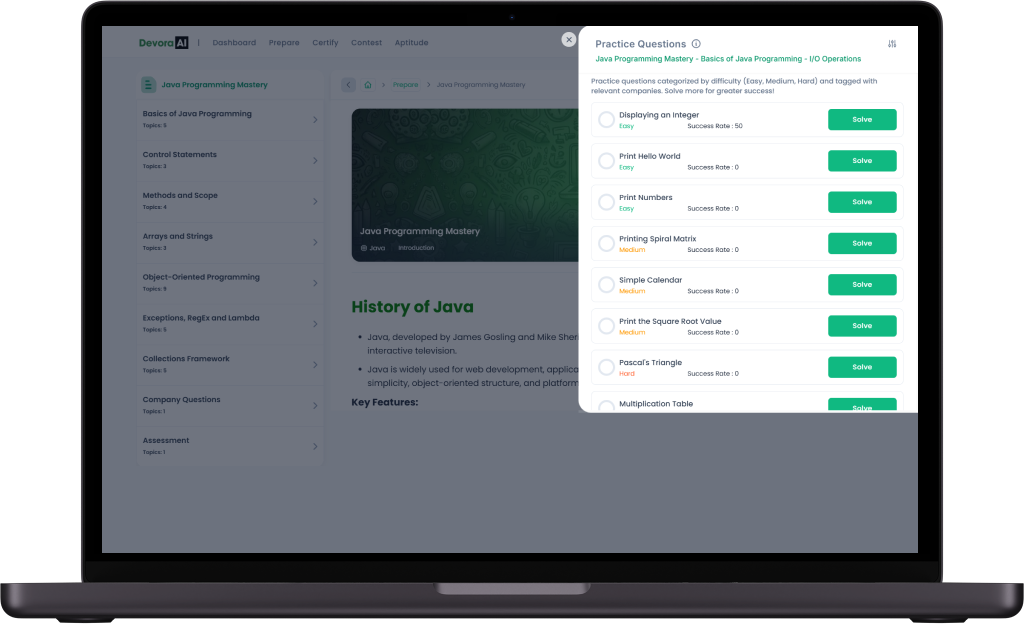
We maintain a personalized profile for each user, tracking their learning progress, performance in coding problems, and achievements,It also includes a record of completed contests, certifications earned, and coding skills developed etc
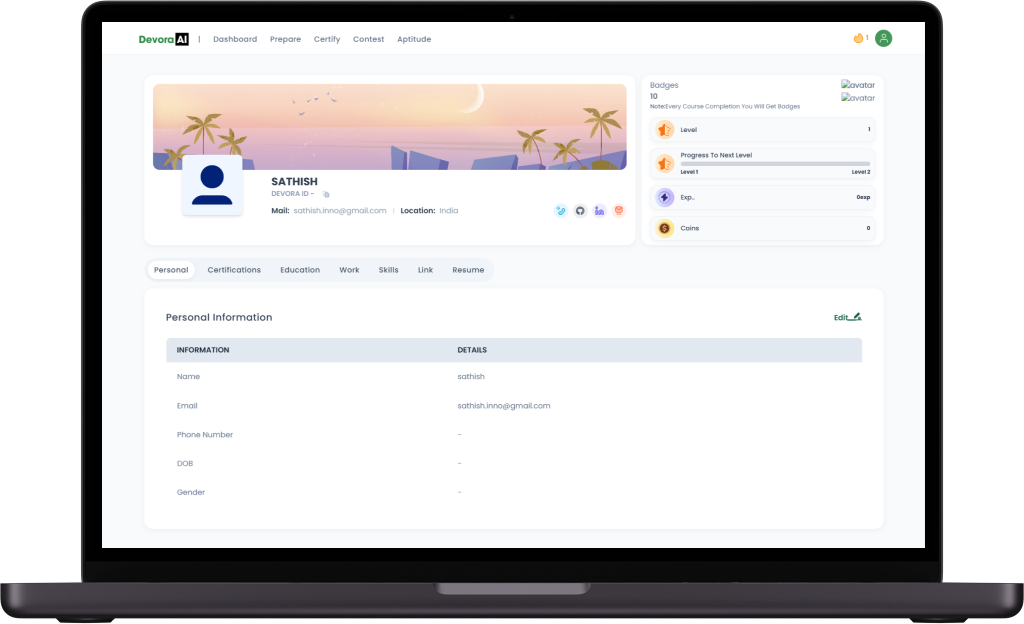
This is one For You
Hands on training
Looking to enhance your Coding skills
Innovation Ideas
lets you create innovative solutions, explore technologies
Newbie Programmer
Budding Programmer , Wants to learn some tricks and tips
Upskilling your skills
A professional wanting to Update their skills
Gain a Competitive Edge With Our Professional Certificates

Master the latest programming languages and enhance your skill set with a recognized certificate.
unlock new career opportunities with a programming certificate


